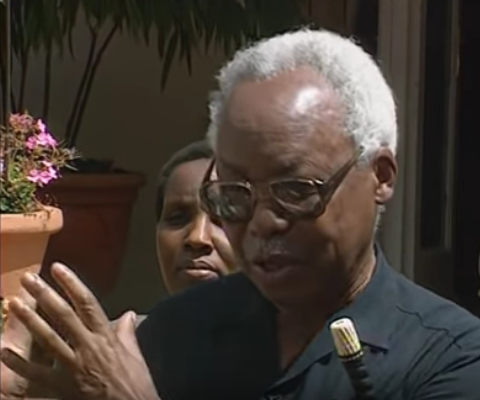[Celebrating Black History Month\Julius Nyerere]
Nyerere: “Education for liberation is therefore also education for co-operation among men, because it is in co-operation with others that Man liberates himself from the constraints of nature, and also those imposed upon him by his fellow-men.”
Photo: Facebook
Julius K. Nyerere (13 April 1922 – 14 October 1999) the great Pan-African activist and former President of Tanzania.
In honor of Black History Month, the Black Star News will be featuring speeches, interviews, poetry, etc. all month from important figures who fought for Black liberation and who represent the Black experience with honor.
The following is an extract from Julius K. Nyerere’s 1978 ”Development is for Man, by Man, and of Man”: The Declaration of Dar es Salaam. Nyerere addresses issues of development and adult education.
“[pg27] Man can only liberate himself or develop himself. He cannot be liberated or developed by another. For Man makes himself. It is his ability to act deliberately, for a self-determined purpose, which distinguishes him from the other animals. The expansion of his own consciousness, and therefore of his power over himself, his environment, and his society, must therefore ultimately be what we mean by development.
“So development is for Man, by Man, and of Man. The same is true of education. Its purpose is the liberation of Man from the restraints and limitations of ignorance and dependency. Education has to increase men’s physical and mental freedom to increase their control over themselves, their own lives, [page 28] the environment in which they live. The ideas imparted by education, or released in the mind through education, should, therefore, be liberating ideas; the skills acquired by education should be liberating skills. Nothing else can properly be called education. Teaching which induces a slave mentality or a sense of impotence is not education at all — itis attack on the minds of men.
“This means that adult education has to be directed at helping men to develop themselves. It has to contribute to an enlargement of Man’s ability in every way. In particular, it has to help men to decide for themselves —in co-operation—what development is. It must help men to think clearly; it must enable them to examine the possible alternative courses of action; to make a choice between those alternatives in keeping with their own purposes; and it must equip them with the ability to translate their decisions into reality.
“The personal and physical aspects of development cannot be separated. It is in the process of deciding for himself what is development, and deciding in what direction it should take his society, and in implementing those decisions, that Man develops himself. For man does not develop himself in a vacuum, in isolation from his society and his environment; and he certainly cannot be developed by others. Man’s consciousness is developed in the process of thinking, and deciding and of acting. His capacity is developed in the process of doing things.
“But doing things means co-operating with others, for in isolation Man is virtually helpless physically, and stultified mentally. Education for liberation is therefore also education for co-operation among men, because it is in co-operation with others that Man liberates himself from the constraints of nature, and also those imposed upon him by his fellow-men. Education is thus intensely personal. In the sense that it has to be a personal experience— no one can have his consciousness developed by proxy. But it is also am activity of great social significance, because the man whom education liberates is a man in society, and his society will be affected by the change which education creates in him.
“There is another aspect to this. A Man learns because he wants to do something. And once he has started along this road of developing his capacity he also learns because he wants to be; to be a more conscious and understanding person. Learning has not liberated a man if all he learns to want is a certificate [page 29] on his wall, and the reputation of being a ‘learned person’— a possessor of knowledge. For such a desire is merely another aspect of the disease of the acquisitive society – the accumulation of goods for the sake of accumulating then. The accumulation of knowledge or, worse still, the accumulation of pieces of paper which represent a kind of legal tender for such knowledge, has nothing to do with development.
“So if adult education is to contribute to development, it must be a part of life — integrated with life and inseparable from it. It is not something which can be put into a box and taken out for certain periods of the day or week—or certain periods of a life. And it cannot be imposed: every learner is ultimately a volunteer, because, however much teaching he is given, only he can learn.
“Further, adult education is not something which can deal with just “agriculture”, or “health”, or “literacy”, or “mechanical skill”, etc. All these separate branches of education are related to the total life a man is living, and to the man he is and will become. Learning how best to grow soy-beans is of little use to a man if it is not combined with learning about nutrition and/or the existence of a market for the beans. This means that adult education will promote changes in men, and in society. And it means that adult education should promote change, at the same time as it assists men to control both the change which they induce, and that which is forced upon them by the decisions of other men or the cataclysms of nature. Further, it means that adult education encompasses the whole of life, and must build upon what already exists.”






